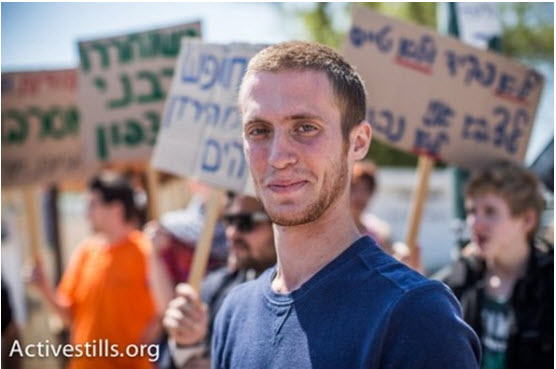After two years in the Israel Defense Forces, Yaron Kaplan, 21, of Lod, has declared himself a conscientious objector and refuses to continue his military service because of Israel’s occupation of the West Bank. While every year there are dozens of draftees who refuse to serve because they object to the occupation – some 50 youths last year alone – for a soldier to opt out for this reason in the middle of his service is relatively rare.

Yaron Kaplan and dozens of others who have refused service demonstrated in front of the army induction center in Tel Hashomer on last Monday, April 6, to protest the detention of several others, including Yehiel Nahmani and Effi Dershner, who are in prison, and Ido Ramon, who has been sent to prison for a second time. (Photo: Activestills)
Kaplan, a graduate of a military prep school, was drafted as a combat soldier in the Nahal Brigade two years ago, but upon beginning his training he realized he wasn’t cut out for combat. “From the moment I began my training I understood how violent this place is,” he recalled. “It was a totally traumatic experience. Every time we practiced shooting, we would be ‘executing’ someone – ‘Now we shoot Mohammed; now we shoot at Ahmed,’” he said.
Because Kaplan is an only child, he had required his mother’s permission to do combat service in the first place; subsequently he asked her to rescind her agreement. He was reassigned to the training base headquarters of the Nahal Brigade. “As a result I somehow became reconciled to the fact that I’m in the army, understanding that we need an army, and I would do the best I could to change the system from within,” he recalled. He even thought of taking an officers’ course. But at some point, he realized that, “he couldn’t represent the system,” as he put it. “The army has a very violent nature and I couldn’t be its emissary.” He said he took leave from the army during the period before last month’s Knesset election and volunteered to work for Hadash in the Joint List campaign. It was only then that it became clear to him that he did not want to continue his army service.
“I understood something that until then I’d been avoiding: that I can’t expect or demand from a person that he be my partner, or that he should really see me as a partner for dialogue as long as I am imposing a military regime on him,” he said. “There’s this inequality and the situation itself is so asymmetrical that there’s no basis for discourse. If I want this cooperation, the most fundamental thing I can do is to refuse to be part of this regime,” said Kaplan to Haaretz.
A few days before Passover Kaplan refused to return to his base, and he is now considered AWOL. While at home last Monday, April 6, he and dozens of others who have refused to perform military service demonstrated in front of the army induction center at Tel Hashomer to protest the detention of several others, including Yehiel Nahmani and Effi Dershner, who are in prison, and Ido Ramon, who has been sent to prison for a second time.
“I see people who refuse to serve, including myself, as people who are taking responsibility for the situation,” Kaplan said. “There’s no reason for them to be jailed for this, especially when they are contributing in other ways. “My commanders know full well that this is a matter of conscience,” he says of his refusal to serve. “I made sure to make that clear to all my commanders. I decided to leave because I am no longer capable of taking part. And I call on everyone, not necessarily to refuse service, but to make his own choices, to take responsibility.”
After Passover he plans to present himself at his base and be sent to prison. “I am fully aware of the ramifications of this, what the path before me looks like – a lot of prison, including lengthy terms,” Kaplan said. “I’m a person who believes that you have to listen to your heart, to follow your beliefs. I have no doubt that this is the right thing to do. The emotional price and the price to my conscience that I would have to pay for the mental suffering of being in the army are too heavy from my perspective. To be [another] year in the army is impossible on the most practical level. I would suffer terribly.”


